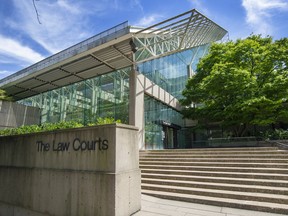Mark and Shauna Trieb, travel bloggers who live in Texas, sold the property to Wilson Weizin (Weixing) Cui through a contract signed on Sept. 5, 2022

An American couple is facing a lawsuit after they sold their $17 million house in Whistler without paying their federal vacancy tax bill for 2022, the first year the tax became law, according to a lawsuit.
Recommended Videos
Mark and Shauna Trieb, travel bloggers who live in Dallas, Texas, sold the property to Wilson Weizin (Weixing) Cui through a contract signed on Sept. 5, 2022, according to a case filed in B.C. Supreme Court.
The sale completed on Jan. 18, 2023, with Cui’s purchase of all of the shares of a holding company through which the Triebs owned the property, according to documents filed in court. They were sole directors and shareholders of the company, it said.
The sale contract included a warranty that the Triebs’ holding company had paid all taxes, but Cui said it hadn’t, leaving him to pay $127,910 under the federal government’s underused housing tax for non-resident owners, it said.
The tax came into effect on Jan. 1, 2022, and requires paying one per cent of the value of a vacation home, unless the owners are exempted, according to Canada.ca. Foreign owners are exempted, for instance, if the property is their primary residence and they live there for more than six months a year.
The Triebs’ travel blog says they built the house on Trail’s End Lane in Whistler in 2017, but it’s not known how much time they spent there in 2022.
There are also exemptions or lower occupancy requirements dependent on where the housing is located, based on whether the area is habitable year-round, for instance. The Canada.ca website said the owner or spouse may need to spend only 28 days a year to be exempt from paying the tax. That exemption applied in the Trial’s End Lane’s postal code.
Cui’s lawsuit said there was a tax assessed against the property for 2022 and the couple breached their sales contract because they failed to pay the tax or to reimburse Cui, the case alleges.
“The (Triebs’) representation that the holding company had filed all tax returns and paid all tax liabilities was untrue, inaccurate and/or misleading,” according to Cui’s claim.
Individual Canadians are usually exempt from the tax, as are owners of publicly traded Canadian corporations, certain trusts, registered charities, co-operative housing corporations, municipal organizations and other public institutions, government bodies, and Indigenous governing bodies.
All non-resident owners and some Canadians still have to file a vacancy tax return, even if they qualify for and exemption, it said.
A message left on the Triebs’ travel blog wasn’t returned.
None of the allegations has been proven in court.